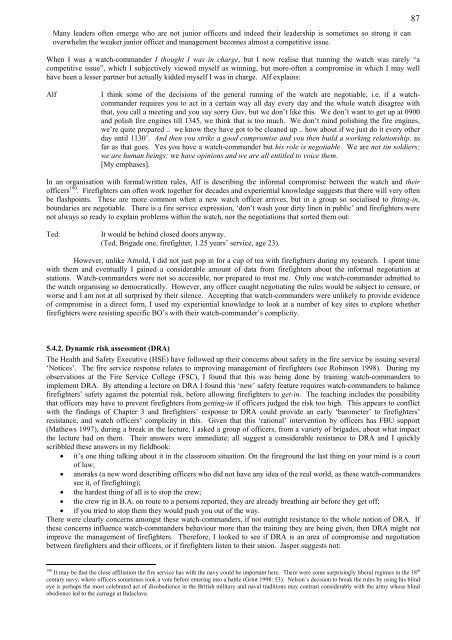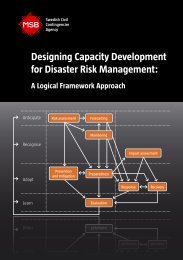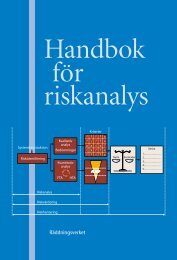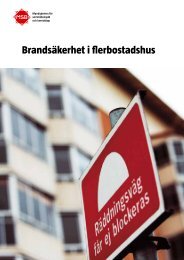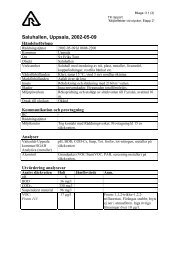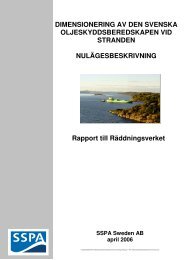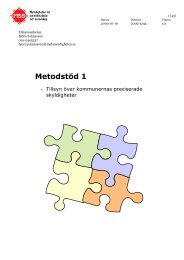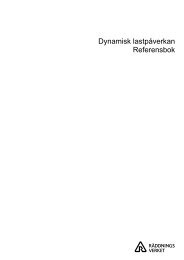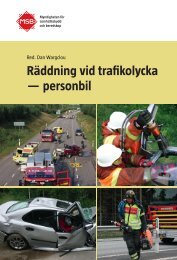One more last working class hero
One more last working class hero
One more last working class hero
You also want an ePaper? Increase the reach of your titles
YUMPU automatically turns print PDFs into web optimized ePapers that Google loves.
Many leaders often emerge who are not junior officers and indeed their leadership is sometimes so strong it can<br />
overwhelm the weaker junior officer and management becomes almost a competitive issue.<br />
When I was a watch-commander I thought I was in charge, but I now realise that running the watch was rarely “a<br />
competitive issue”, which I subjectively viewed myself as winning, but <strong>more</strong>-often a compromise in which I may well<br />
have been a lesser partner but actually kidded myself I was in charge. Alf explains:<br />
87<br />
Alf<br />
I think some of the decisions of the general running of the watch are negotiable, i.e. if a watchcommander<br />
requires you to act in a certain way all day every day and the whole watch disagree with<br />
that, you call a meeting and you say sorry Guv, but we don’t like this. We don’t want to get up at 0900<br />
and polish fire engines till 1345, we think that is too much. We don’t mind polishing the fire engines,<br />
we’re quite prepared .. we know they have got to be cleaned up .. how about if we just do it every other<br />
day until 1130’. And then you strike a good compromise and you then build a <strong>working</strong> relationship, as<br />
far as that goes. Yes you have a watch-commander but his role is negotiable. We are not tin soldiers;<br />
we are human beings; we have opinions and we are all entitled to voice them.<br />
[My emphases].<br />
In an organisation with formal/written rules, Alf is describing the informal compromise between the watch and their<br />
officers 190 . Firefighters can often work together for decades and experiential knowledge suggests that there will very often<br />
be flashpoints. These are <strong>more</strong> common when a new watch officer arrives, but in a group so socialised to fitting-in,<br />
boundaries are negotiable. There is a fire service expression, ‘don’t wash your dirty linen in public’ and firefighters were<br />
not always so ready to explain problems within the watch, nor the negotiations that sorted them out:<br />
Ted:<br />
It would be behind closed doors anyway.<br />
(Ted, Brigade one, firefighter, 1.25 years’ service, age 23).<br />
However, unlike Arnold, I did not just pop in for a cup of tea with firefighters during my research. I spent time<br />
with them and eventually I gained a considerable amount of data from firefighters about the informal negotiation at<br />
stations. Watch-commanders were not so accessible, nor prepared to trust me. Only one watch-commander admitted to<br />
the watch organising so democratically. However, any officer caught negotiating the rules would be subject to censure, or<br />
worse and I am not at all surprised by their silence. Accepting that watch-commanders were unlikely to provide evidence<br />
of compromise in a direct form, I used my experiential knowledge to look at a number of key sites to explore whether<br />
firefighters were resisting specific BO’s with their watch-commander’s complicity.<br />
5.4.2. Dynamic risk assessment (DRA)<br />
The Health and Safety Executive (HSE) have followed up their concerns about safety in the fire service by issuing several<br />
‘Notices’. The fire service response relates to improving management of firefighters (see Robinson 1998). During my<br />
observations at the Fire Service College (FSC), I found that this was being done by training watch-commanders to<br />
implement DRA. By attending a lecture on DRA I found this ‘new’ safety feature requires watch-commanders to balance<br />
firefighters’ safety against the potential risk, before allowing firefighters to get-in. The teaching includes the possibility<br />
that officers may have to prevent firefighters from getting-in if officers judged the risk too high. This appears to conflict<br />
with the findings of Chapter 3 and firefighters’ response to DRA could provide an early ‘barometer’ to firefighters’<br />
resistance, and watch officers’ complicity in this. Given that this ‘rational’ intervention by officers has FBU support<br />
(Mathews 1997), during a break in the lecture, I asked a group of officers, from a variety of brigades, about what impact<br />
the lecture had on them. Their answers were immediate; all suggest a considerable resistance to DRA and I quickly<br />
scribbled these answers in my fieldbook:<br />
• it’s one thing talking about it in the <strong>class</strong>room situation. On the fireground the <strong>last</strong> thing on your mind is a court<br />
of law;<br />
• anoraks (a new word describing officers who did not have any idea of the real world, as these watch-commanders<br />
see it, of firefighting);<br />
• the hardest thing of all is to stop the crew;<br />
• the crew rig in B.A. on route to a persons reported, they are already breathing air before they get off;<br />
• if you tried to stop them they would push you out of the way.<br />
There were clearly concerns amongst these watch-commanders, if not outright resistance to the whole notion of DRA. If<br />
these concerns influence watch-commanders behaviour <strong>more</strong> than the training they are being given, then DRA might not<br />
improve the management of firefighters. Therefore, I looked to see if DRA is an area of compromise and negotiation<br />
between firefighters and their officers, or if firefighters listen to their union. Jasper suggests not:<br />
190 It may be that the close affiliation the fire service has with the navy could be important here. There were some surprisingly liberal regimes in the 18 th<br />
century navy, where officers sometimes took a vote before entering into a battle (Grint 1998: 53). Nelson’s decision to break the rules by using his blind<br />
eye is perhaps the most celebrated act of disobedience in the British military and naval traditions may contrast considerably with the army whose blind<br />
obedience led to the carnage at Balaclava.


